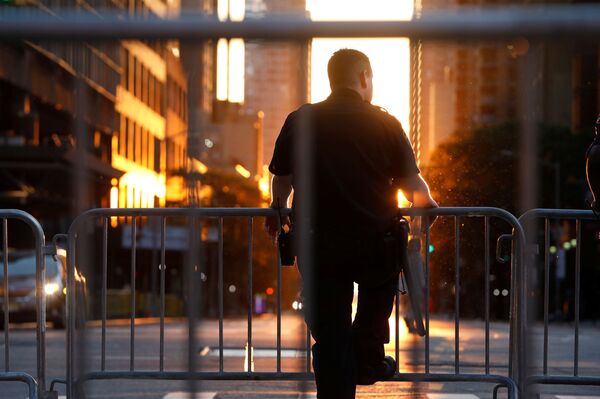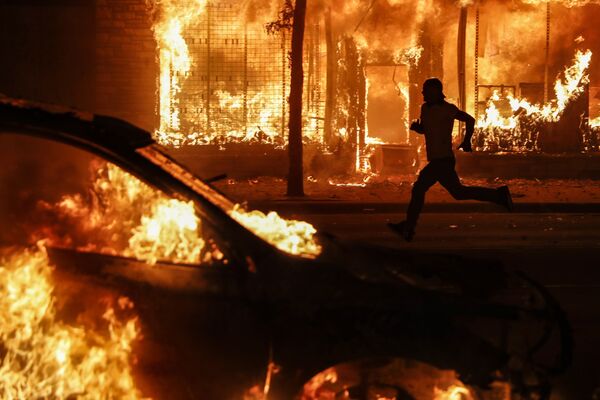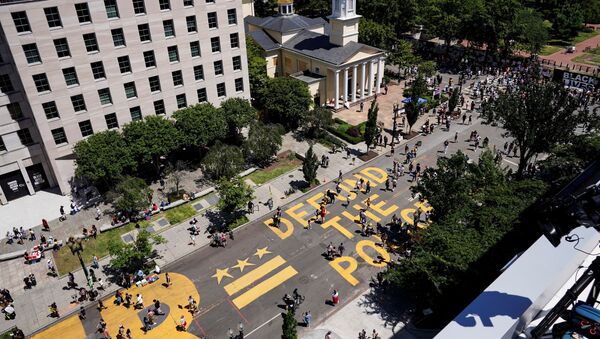Demands by protesters to “defund the police" following George Floyd's death have already caused widespread debates about the meaning of this slogan, which is not only about stripping police agencies of their money but also aims to underscore the necessity of resolving systemic problems pertaining to these agencies.
During a recent interview with NBC, Black Lives Matter co-founder Alicia Garza wondered why “we can’t look at how it is that we reorganise our priorities, so people don’t have to be in the streets during a national pandemic”.
Black Lives Matter (BLM) is an international human rights movement that campaigns against violence and systemic racism towards African American people.

Activists from the group MPD150, in turn, signalled their readiness to work "towards a police-free Minneapolis", an action that they claimed would be more about “strategically reallocating resources, funding, and responsibility away from police and toward community-based models of safety, support, and prevention".
The group wrote on its website that “the people who respond to crises in our community should be the people who are best-equipped to deal with those crises”.
Democratic Senator Cory Booker, for his part, told NBC that Americans are "over-policed", adding that "we are investing in police, which is not solving problems, but making them worse when we should be, in a more compassionate country, in a more loving country".
The same tone was struck by Karen Bass, chairwoman of the Congressional Black Caucus, who said in an interview with CNN that she doesn’t believe it’s necessary to disband police departments but she does think that "in cities, in states, we need to look at how we are spending the resources and invest more in our communities".
According to her, "maybe this is an opportunity to re-envision public safety".
This was echoed by New York City and Los Angeles Mayors Bill de Blasio and Eric Garcetti, respectively, who indicated an intent to cut hefty sums allocated for their police departments' budgets.
The City Council of Minneapolis has, meanwhile, pledged to disband the city’s police department, also vowing to come up with a new community-led system for public safety. Eight of the thirteen council members delivered the statement to the residents of Minneapolis on Sunday.
"Decades of police reform efforts have proved that the Minneapolis Police Department cannot be reformed, and will never be accountable for its action. We are here today to begin the process of ending the Minneapolis Police Department and creating a new transformative model for cultivating safety in our city", the Council statement said.

The plans were criticised by the Los Angeles Police Protective League (LAPD), which warned in a statement last week that "cutting the LAPD budget means longer responses to 911 emergency calls, officers calling for back-up won’t get it, and rape, murder, and assault investigations won’t occur or will take forever to initiate, let alone complete".
The group cautioned that an intention to defund the police is "the most irresponsible thing anyone can propose at this time, with violent crime increasing, a global pandemic and nearly a week’s worth of violence, arson, and looting".
US President Donald Trump, for his part, also did not mince words when he addressed the topic when speaking at an event in Maine last week.
"They’re saying defund the police. Defund. Think of it. When I saw it, I said, ‘What are you talking about?’ ‘We don’t want to have any police,' they say. You don’t want police?", he noted.
Minneapolis became the starting point for large-scale protests that rocked all 50 US states after African American George Floyd was killed in custody by white police officer Derek Chauvin on 25 May.



